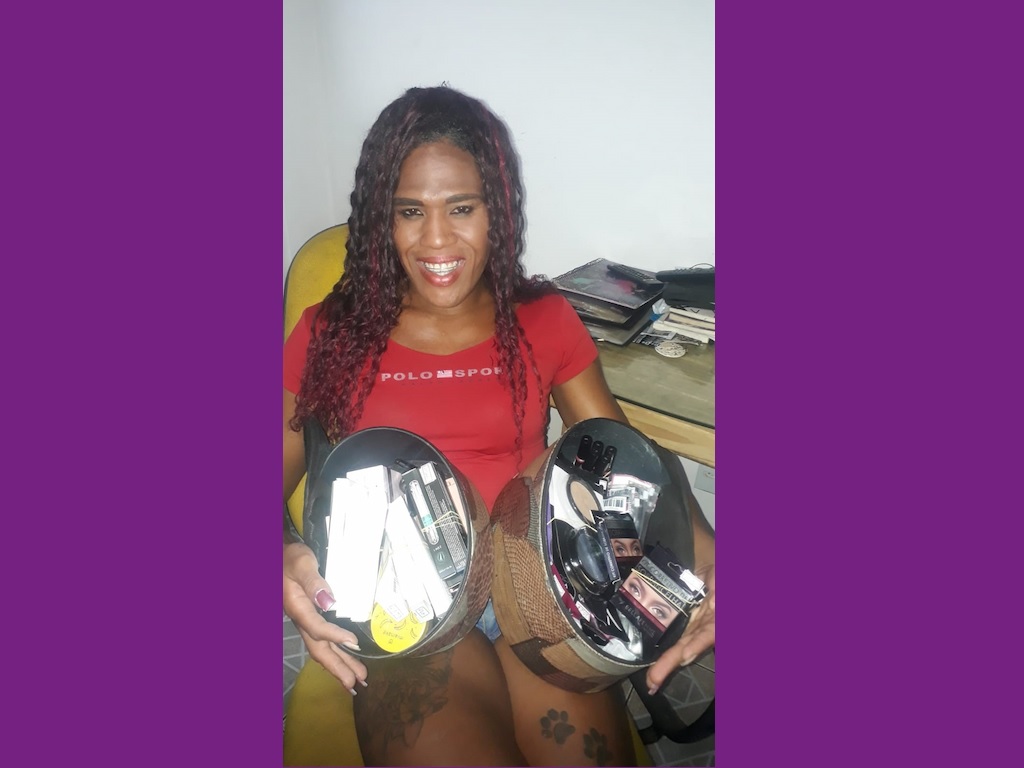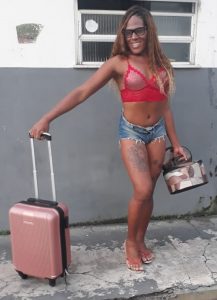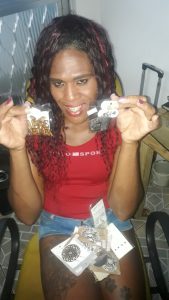Wanessa Simeão is a black trans woman who lives in a dangerous area with high crime rates in Rio de Janeiro. She has had very little access to formal education and used to earn a very low income, mainly from services provided without formal contracts and in conditions of great risks and vulnerability. To supplement her income, she would sell makeup products in her neighbourhood. In 2020, a friend told her about Micro Rainbow International Foundation’s 7th small business training for low income LGBTI entrepreneurs and she decided to apply.
Wanessa’s challenges
Participating in an online training was a huge challenge for Wanessa, as she had very limited virtual access, both because of weak network coverage and because of her lack of digital skills. Our team provided her with IT support throughout the training as well as covered her internet costs. However, since she lives in a very precarious area, where essential services (including electricity) are constantly cut off, Wanessa often had to leave her house and find other places, such as gas stations, to watch the classes.
Despite all these difficulties, Wanessa persisted in the training and was one of the most assiduous and participative students and always inspired others with her astute comments and great sense of humour. She regularly reached out for support to MRIF’s team (coordinators, teachers and tutor) and participated in all training activities. Considering her lack of digital skills, she completed all the homework and training exercises in a notebook and her business plan was entirely hand-written. She photographed the pages and submitted them to Professor Isaque.
Business plan
Wanessa’s business plan was designed to make sales of makeup products a more profitable business. She used to invest around R$200 in the purchase of new products but would make a profit of only R$180 after 30 days. Through the training she realised she would have to increase the working capital to at least R$2,000 so that sales could become half her total income. In addition, in order to increase sales, she was advised to diversify products and include others which may appeal to her clients, such as cosmetics and clothing.
Outstanding student
Wanessa’s hard work in the training, her steady engagement and inspiration to all were acknowledged when she was selected as one of the outstanding students who received seed capital at the end of the training. Winning MRIF’s award encouraged her to finally see herself as a businesswoman and, for the first time in her life, she felt her human and professional potential were recognised. Her background meant she never had opportunities to develop her skills as an entrepreneur, but during the training she demonstrated a talent for sales and finances. Selecting her as one of the winners gave her self-esteem and confidence a boost so that she could see a future in her business.
Investment
With MRIF’s investment of R$3091:
- she purchased a wider range of products for resale,
- packaging and labels,
- stationery for financial organization,
- as well as a suitcase and flasks to improve transporting and presenting the products.
To meet the funding requirements, Wanessa received support from MRIF’s coordinator Ivana, who assisted her in filling in spreadsheets, scanning receipts and managing the accounts. Additionally, with the support of volunteers, Wanessa was able to produce a marketing plan, a branding strategy and a logo for her newly named business: Walore.
Expansion
Wanessa continues to visit her clients in her neighbourhood and has expanded her sales to small beauty salons and massage parlours. To increase her profit and meet her clients’ requests, she also expanded the range of products to include sex toys and lingerie. Although Brazil is experiencing a serious economic crisis, Wanessa’s sales have gone up and her net profit increased 15 times, thanks to MRIF’s seed capital. As she could not access other credit opportunities with fair interest rates and reasonable payment conditions, there were not many options for injecting capital into her business. With MRIF’s investment, her situation has completely changed and her business became her main source of income. As a result, she is now less exposed to risky income-generating activities and precarious work conditions. The most important thing is that she has realised her potential to achieve financial autonomy and is currently making plans to further develop her business. She told us:
“My sales have increased a lot and now I’m earning enough to make a living. I’m also trying to keep the working capital, as I learned from professor Isaque. Nothing you taught me was in vain. My life is getting better and I could finally buy a few things for my house which I’ve been hoping to get for a long time, such as a washing machine. And I hope to help other LGBTI people so that they can have the same opportunities to succeed as I did.”
Support for Wanessa
Wanessa was already an entrepreneur before MRIF’s 7th LGBTI small business training but did not believe she had enough skills to become a businesswoman. The big change came when she met, through our training, a group of people, among staff and students, who believed in her and were keen on supporting and encouraging her business. Wanessa is an example that there is no magic solution to promote economic empowerment for vulnerable LGBTI people. However, with empathy, creativity, sensitive tutoring and exchange of knowledge, it is possible to assist them in improving their skills, increasing their income and overcome their barriers and fears.



